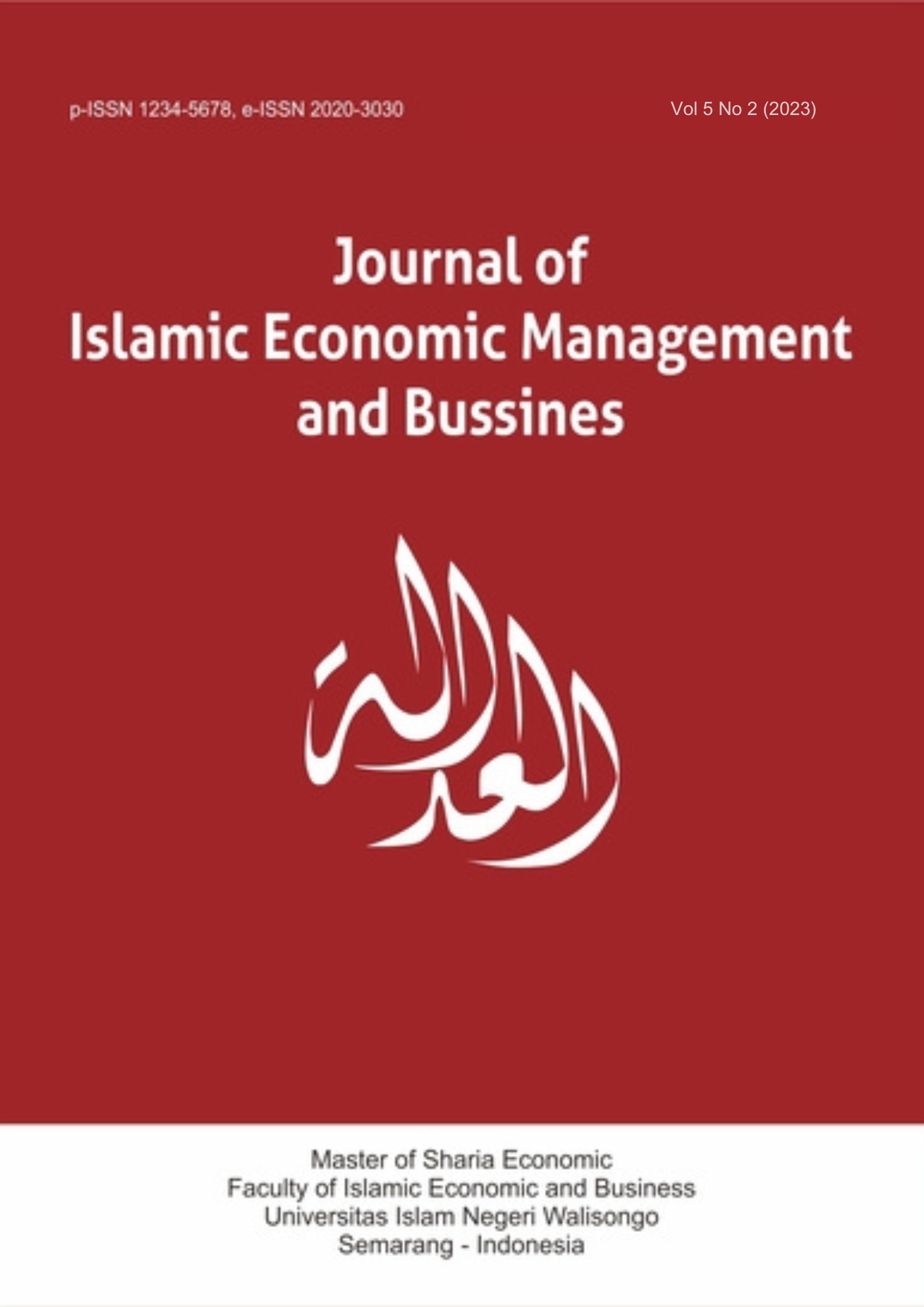Reconstructing zakat within sharia philanthropy
DOI:
https://doi.org/10.21580/jiemb.2023.5.2.22284Keywords:
zakat, sharia philanthropy, poverty alleviation, Islamic social finance, community development.Abstract
The quality of a believer’s faith in Islam is evidenced through their interactions in a social context, with zakat being a critical religious duty that transcends mere ritualistic worship to embody profound social implications. This study explores the reconstruction of zakat within Sharia philanthropy to enhance its effectiveness in alleviating poverty and supporting sustainable welfare. Using a qualitative descriptive approach, the research involves an extensive literature review and data analysis from various sources. Findings indicate that zakat, when managed properly, significantly improves the economic well-being of the ummah, particularly among the poor and the eight designated beneficiaries. The article identifies critical factors facilitating zakat reconstruction, such as legal frameworks, community engagement, and technological advancements. It also highlights the challenges in zakat management, including regulatory issues and inefficiencies in distribution. The implications of reconstructing zakat within Sharia philanthropy include enhanced transparency, efficiency, and impact on social welfare, transforming recipients from passive beneficiaries into active, productive community members. This article contributes to the discourse on Islamic social finance by proposing a structured approach to optimizing zakat practices, thereby aligning them with the aspirations of the Muslim community for equitable economic development.
Downloads
References
al-Mubarok, F., & Muslim, A. B. M. B. (2020). Kesalehan Sosial Melalui Pendidikan Filantropi Islam. JIEBAR: Journal of Islamic Education: Basic and Applied Research, 1(1), 1-15. https://doi.org/10.33853/jiebar.v1i1.57
Al-Mubarak, M. A. R., Iman, N., & Hariadi, F. W. (2021). Rekonstruksi Undang-Undang Nomor 23 Tahun 2011 Tentang Pengelolaan Zakat (Analisis Hukum Ekonomi Syariah). Musyarakah: Journal of Sharia Economic (MJSE), 1(1), 62-79. https://doi.org/10.24269/mjse.v1i1.4166
Anwar, A. S. H. (2016). Model Pemberdayaan Ekonomi Mustahiq Melalui Zakat. Jurnal Ekonomi Akuntansi Dan Manajemen, 15(1), 51–61. https://doi.org/10.19184/jeam.v15i1.2325
Awaluddin, A., & Saputro, A. D. (2020). Rekontruksi Pemikiran KH. Ahmad Dahlan dalam Pendidikan Islam Berkemajuan. Muaddib: Studi Kependidikan Dan Keislaman, 1(2), 182–204. https://doi.org/10.24269/muaddib.v1i2.3360
Aziz, A., Fasa, M. I., & Suharto, S. (2022). Strategi Pengelolaan Zakat Produktif dalam Pengentasan Kemiskinan: Studi Kasus Baznas Kota Bandar Lampung. Jurnal Bina Bangsa Ekonomika, 15(1), 151-158. https://doi.org/10.46306/jbbe.v15i1.132
Fitri, M. (2017). Pengelolaan Zakat Produktif sebagai Instrumen Peningkatan Kesejahteraan Umat. Economica: Jurnal Ekonomi Islam, 8(1), 149-173. https://doi.org/10.21580/economica.2017.8.1.1830
Hardi, E. A. (2020). Filantropi Islam: Zakat Saham di Pasar Modal Syariah Indonesia. Jurnal Bimas Islam, 13, 51–72. https://doi.org/10.37302/jbi.v13i1.106
Hartono, H. (2021). Rekontruksi Penulisan Teks Al-Quran Modern. Al-Bayan: Jurnal Ilmu al-Qur’an dan Hadist, 4(2), 232-243. https://doi.org/10.35132/albayan.v4i2.138
Jamhur, D. M. (2014). Rekontruksi Fiqh Zakat Perhiasan dalam Perspektif Qadhi Abu Syuja‘ Al-Asfahani dan A. Hassan. Asy-Syari’ah, 16(2), 135–144. https://doi.org/10.15575/as.v16i2.633
Kasdi, A. (2016). Filantropi Islam Untuk Pemberdayaan Ekonomi Umat (Model Pemberdayaan Ziswaf di BMT Se-Kabupaten Demak). Iqtishadia: Jurnal Kajian Ekonomi dan Bisnis Islam, 9(2), 227-245. https://doi.org/10.21043/iqtishadia.v9i2.1729
Khotimah, U. K. (2020). Filantropi Zakat: Solusi Stabilitas Ekonomi Syariah di Tengah Pandemi covid 19. Al-Mizan : Jurnal Hukum dan Ekonomi Islam, 4(2), 35-55. https://doi.org/10.33511/almizan.v4n2.35-55
Latief, H. (2016). Filantropi dan Pendidikan Islam di Indonesia. Jurnal Pendidikan Islam, 28(1), 123-139. https://doi.org/10.15575/jpi.v28i1.540
Madani, H. R. (2021). Implementasi Penggunaan Kecerdasan Buatan Pada Industri Fintech Syariah. Jurnal Geuthèë: Penelitian Multidisiplin, 4(3), 128-141. https://doi.org/10.52626/jg.v4i3.121
Noor, W. (2017). Rekonstruksi Pendidikan Agama Islam. https://www.academia.edu/118984449/Rekonstruksi_Pendidikan_Agama_Islam
Patilima, A. A., & Yusuf, S. D. (2023). Rekonstruksi Sadar Zakat dalam Membangun Kesalehan Sosial. Jurnal Riset Rumpun Agama Dan Filsafat, 2(1), 20–29. https://doi.org/10.55606/jurrafi.v2i1.876
Purbasari, I. (2015). Pengelolaan Zakat Oleh Badan dan Lembaga Amil Zakat di Surabaya dan Gresik. Mimbar Hukum - Fakultas Hukum Universitas Gadjah Mada, 27(1), Article 1. https://doi.org/10.22146/jmh.15911
Purwanto, Y. (2014). Memaknai Pesan Spiritual Ajaran Agama dalam Membangun Karakter Kesalehan Sosial. Jurnal Sosioteknologi, 13(1), Article 1. https://doi.org/10.5614/sostek.itbj.2014.13.1.5
Purwatiningsih, A. P., & Adinugraha, H. H. (2018). Histori Filantropi: Tinjauan Teori Postmodern. ZISWAF: Jurnal Zakat dan Wakaf, 5(1), Article 1. https://doi.org/10.21043/ziswaf.v5i1.3573
Rodin, D. (2015). Rekonstruksi Konsep Fakir dan Miskin sebagai Mustahik Zakat. Ijtihad Jurnal Wacana Hukum Islam dan Kemanusiaan, 15(1), Article 1. https://doi.org/10.18326/ijtihad.v15i1.137-158
Sahabi, A., & Ajuna, L. H. (2022). Transformasi Filantropi Islam sebagai Model Pemberdayaan Zakat, Infak, Sedekah, dan Wakaf (Ziswaf). Asy Syar’iyyah: Jurnal Ilmu Syariah Dan Perbankan Islam, 7(2), 233–252. https://doi.org/10.32923/asy.v7i2.2770
Sundari, A., Asi, Y. S., & Bilgies, A. F. (2021). Peran Filsafat Ilmu terhadap Ilmu Ekonomi sebagai Landasan Rekontruksi Ekonomi Pancasila. HUMANIS: Jurnal Ilmu-Ilmu Sosial Dan Humaniora, 13(2), Article 2. https://doi.org/10.52166/humanis.v13i2.2485
Suryani, D., & Fitriani, L. (2022). Peran Zakat dalam Menanggulangi Kemiskinan. Al Iqtishod: Jurnal Pemikiran Dan Penelitian Ekonomi Islam, 10(1), Article 1. https://doi.org/10.37812/aliqtishod.v10i1.307
Syahril, S., Abdullah, W., & Syahruddin, S. (2019). Model Pemberdayaan Ekonomi dengan Filantropi Islam dalam Mewujudkan Kesejahteraan Masyarakat. IQTISHADIA: Jurnal Ekonomi & Perbankan Syariah, 6(1), Article 1. https://doi.org/10.19105/iqtishadia.v6i1.2296
Ulpah, M., & Hafifi, A. (2021). Strategi Corporate Fundraising Zakat Infak dan Shadaqah pada Lazismu. Madani Syari’ah: Jurnal Pemikiran Perbankan Syariah, 4(2), Article 2.
Downloads
Additional Files
Published
Issue
Section
License
Authors who publish with this journal agree to the following terms:
Authors retain copyright and grant the journal right of first publication with the work simultaneously licensed under a Creative Commons Attribution-ShareAlike 4.0 International License that allows others to share the work with an acknowledgement of the work's authorship and initial publication in this journal.
Authors are able to enter into separate, additional contractual arrangements for the non-exclusive distribution of the journal's published version of the work (e.g., post it to an institutional repository or publish it in a book), with an acknowledgement of its initial publication in this journal.
Authors are permitted and encouraged to post their work online (e.g., in institutional repositories or on their website) prior to and during the submission process, as it can lead to productive exchanges, as well as earlier and greater citation of published work (See The Effect of Open Access).



